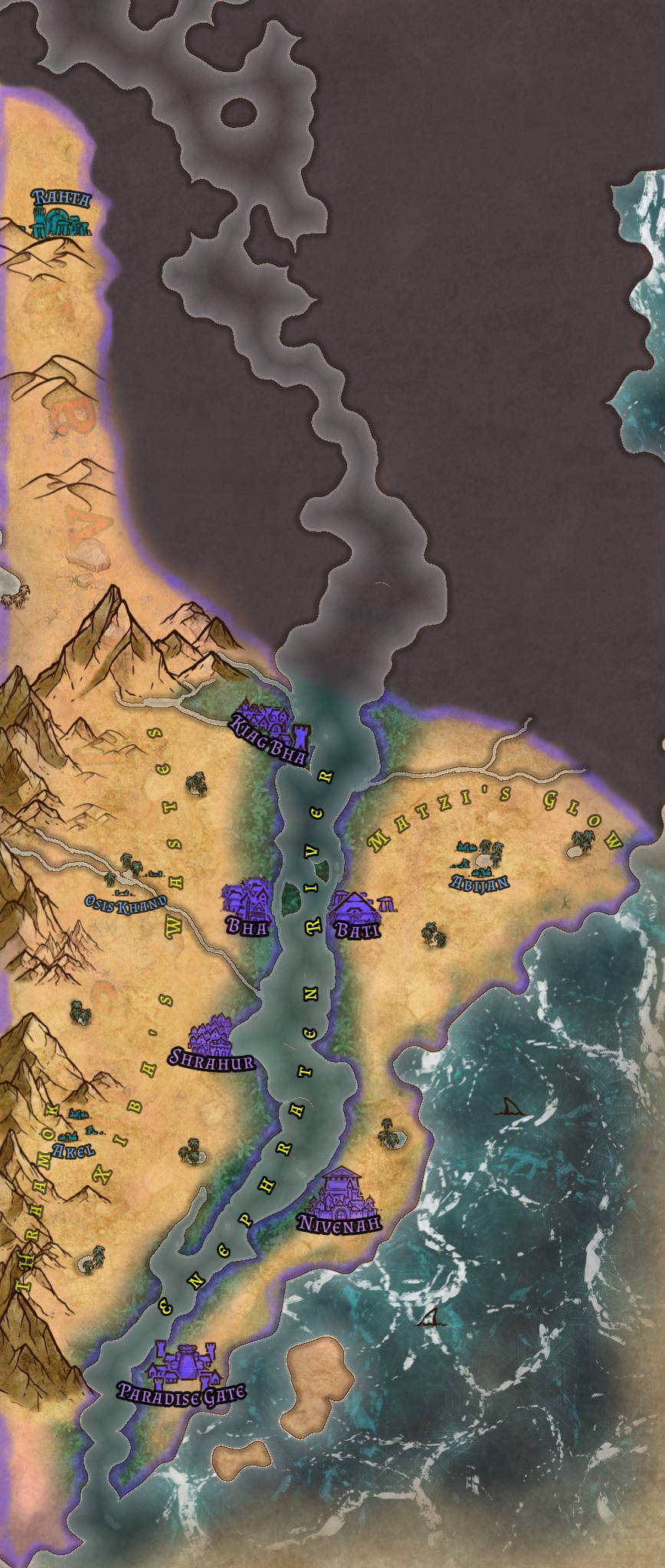Khemkavan
The Largest country of Lower Amarron, Khemkavan (Dynasty of Khem) is the major exporter of the many "unnatural" things of the world of Vestrata. It's denizens themselves are of an odd disposition, from half-breed demons, Lizardmen, and undead, Khemkavan is an oddity even to the peoples of Vestrata.
The name of the country is derived from the Amarronite god Khem, who according to legend was slain by his brother, and used to bring life to the desolate land. It is said that without this boon they would surely have suffered a meager existence, living off of the sparse vegetation that grows in the desert plains. A cyclical harvest season makes sure that the Khemites have enough to sustain their economy and export the rest to the other continents. The cycle also benefits their northern neighbors, though only in the season when their fields are dry.
The major religion in Khemkavan is based on the worship of Khem, and the teachings of cycles. Birth turns to death, which turns to new life. The changes of the harvest season, the death of a family member, or the birth of a new one are all celebrated, as these event encompass the whole of their religion. This philosophy extends to magical application, and the act of raising the dead is common among the specially trained priesthood, The Pavitre(Anointed)
The Enephraten River plays a large role in trade and agriculture that cannot be denied. Access to the ocean of the south, as well as all the way up to Western Fjallsgard have put the merchants in the business of shipping the bounties to other ports. This, as well as the pelts and materials from the desert and oasis dwelling creatures is a virulent business. Artisans from Scarberren to Vabensmiths from Hobsrunne vie for the chance to craft with the potent foreign oddities.
Structure
Luh-Gal-(pronounced loo-gahl) Is the head of state for the country. The Luh-Gal is approved by the priesthood's eldest members, and is an honorary Pavitree. His word is considered law in matters of state, and is only second to the word of the Pavitree's highest office, in spiritual matters.
Brahm Pavitra-( pronounced Bra-mm Pah-vee-tra) The highest office among the Pavitre. There is not one Brahm, but many, and is an office obtainable only through years of devotion to meditation and practice. A normal Pavitre may spend a lifetime to gain the title, and only after death, will the current Brahm's decide if the devout is worthy of a ritual rebirth into an un-living servitude. After mummification of the corpse, and special ceremonies that can last days, the worthy clergy is raised to the highest honor in the nation.
Assets
- Khemitic Priests: With magic being a rare sight in the world on its own, the usage of magic that can revive the dead, or reverse fatal scenarios is an even more astounding sight. These religious magical practitioners are trained from a young age to hone their magical prowess in their secretive skills.
- Fertile Bounties: While more than seventy percent of their land is desert, the famous Enephraten River feeds the land around its shores with nutrients, which the Ammaronite peoples have learned to harness through agricultural development. This makes the Kavani people a primary exporter of food to even other parts of the world.
Ethics
- "Death proceeds Life, but those that have work must return to finish the deed." (Kavani devotees that have not ascended to "Anointed" are raised from the dead using a closely guarded ritual by Khemite priests, and are either used as menial labor, or are given a higher task if brought back with some form of sapience.)
- "No man shall draw his blade unless his life or others are threatened" (While not opposed to violence, Khemite practice dictates the restraint of aggression, unless it's for one's own protection, or the protection of an innocent.)
- "The Crystal obelisks that dot the landscape shall not be defiled, destroyed, or altered in any way." (The large crystals that have reliefs of the kavani religion on them as markers through the desert and in the cities are forbidden to be touched unless by any but a priest, and is punishable by death if deemed necessary.
Fallen, but Risen. Buried, but not dead.
Capital
Demonym
"Khemites" "Kavani"
Location
Official Languages
Controlled Territories
Remove these ads. Join the Worldbuilders Guild









Comments